Alot done, but alot more to do
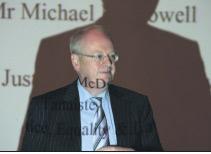
He is a magnet for controversy, argument and media attention. He is a divisive figure even within his own party. He has dominated the period of this government's terms of office, even more so since he became Tániste six months ago. Vincent Browne and Emma Browne contribute critical evaluations of his policies and stances in the first of Village's special editions for Election 2007
To be a PD, or not be a PD TD, that surely is the question
The polls tell us nothing about the PDs. The party's base is too small for the polls to be at all reliable. Elections are a lottery for them, determined mainly by local constituency considerations. In the last election the party lost 10,137 votes (12 per cent) but gained four seats. In this election, the party could gain votes but lose seats.
Paul MacKay, one of the party's trustees, said in a memo last year that only two PD seats were safe in the coming election. It may have been an overstatement. In reality, no PD seat is safe, including Michael McDowell's in Dublin South East. The seats in gravest jeopardy are (in order of jeopardy), Mae Sexton (Longford-Westmeath), Fiona O'Malley (Dun Laoghaire), Tim O'Malley (Limerick East), Tom Parlon (Laois-Offaly) and Noel Grealish (Galway West). But Liz O'Donnell in Dublin South and Mary Harney in Dublin Mid-West are vulnerable too. If Fine Gael is to regain any of the vote it lost in 2002, it has to gain in Dun Laoghaire, Dublin South, Dublin South East, Laois-Offaly and Dublin Mid-West and in each instance a PD seat is at risk.
There is no constituency where the PDs are now likely to gain a seat. Tom Morrissey has no chance of winning a seat in Dublin North and John Minihan no chance of winning a seat with the PDs in Cork South Central.
Michael McDowell is a clever campaigner and will run hard with the slogan ‘The best is yet to come' and with the “slump” scare of a Fine Gael-led government. But how he will differentiate the PDs from Fianna Fáil, having given such uncritical and fulsome support to the major government party, is not evident.
The case for
• In government the party will continue to push for further tax reductions.
•The PDs will insist on further reforms as it has in health and justice and in transport, competition and telecommunications.
•Michael McDowell was one of the few political figures who stood out against the clamour about the initial imprisonment of Pádraig Nally, who had killed the Traveller, John Ward.
The case against
• Michael McDowell was responsible for the debasement of Irish politics in his sponsorship of the citizenship referendum, a racist card played in the run-up to the local and European elections.
• While he has instituted some significant reforms of An Garda Síochána, he has balked at the transformation demanded by the revelations of the Morris Tribunal reports and other reports – several disgraced Gardaí continued to serve in the force after the publication of the reports and the current commissioner, Noel Conway, has remained in office, even though much of the responsibility for failing to act on evidence of Garda corruption and negligence lay with him.
•He was responsible for one of the most egregious wastages of public money in the purchase of the lands at Thornton Hall for the new prison.
•He has deepened the stigmatisation of mental-health problems by insistence on placing the new Central Mental Hospital on the site of a new prison.
•Mary Harney has failed to meet her own bloated promises on the reform of the health system.
The Rottweiler playing poodle on Bertie's money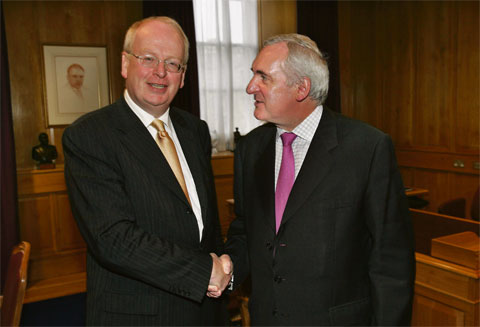
In September 2006 the Irish Times revealed that Bertie Ahern had received donations which previously had been undisclosed. Subsequently Bertie Ahern himself revealed that between 1987 and 1993, during which time he did not have a bank account, he saved £50,000 (€63,500) and lodged that into an account he opened in late-1993 or early-1994.
Around the same time, he made another lodgement of £38,000 (€48,260) which, he claims, represented loans received from friends and with which he paid off a bank loan he had taken out to finance the legal expenses arising in connection with his marriage separation. In October 1994 he made a lodgement of £8,000, which, he says, he got from a group of people in Manchester, who he is unable to name, after he had, as minister for finance, spoken at a dinner there. Around the same time he received a further £16,500 (€20,955) which he got from other friends around the same time.
Also around the same time he took possession of a house, owned by one of his Manchester friends. This Manchester friend purchased the house immediately before Bertie and his then partner, Celia Larkin, started to live there – indeed Celia Larkin viewed the house with the Manchester friend before the latter purchased it. The Manchester friend agreed to give a purchase option to Bertie Ahern and the house was purchased by Ahern in 1997. We have not been told what the purchase option was.
While there is no reason to disbelieve Bertie Ahern about this, the reality is that the Planning Tribunal has been examining these payments to him in the context of its investigation into claims that around the same time, a developer, Owen O'Callaghan, and possible others connected with a proposed casino project in the Phoenix Park, made payments to him.
Bertie Ahern apologised in the Dáil, not for having taken these payments, but because of the “difficulties” and “media intrusion” that resulted and for the public bewilderment and upset caused to himself and those near and dear to him.
Michael McDowell at first (Wednesday 27 September) exonerated Bertie Ahern.
On the following day, he said: “I have to say that there are very significant matters of concern which are not completely put at rest by the facts now in the public domain”. But a day later he signaled that all was well. And finally, he said Bertie was “not unfit for office”, even though answers to obvious questions that arose from all these payments were not forthcoming.
Citizenship – a false claim
Michael McDowell sponsored a referendum on the citizenship issue in early-2004, in the run-up to the local and European elections, on the pretext that there was a major loophole in the Irish constitution that was subverting Irish and European immigration law. The loophole, he claimed, was the entitlement of Irish-born children to Irish citizenship, which in turn gave their families an entitlement to remain in Ireland and elsewhere in the European Union.
The claim was false.
The Irish Supreme Court, in January 2003 in the Lobe case, decided there was no special entitlement to the family of an Irish-born child to be granted asylum here. The loophole was closed by the judgement.
In the course of the campaign, McDowell claimed there was alarm among EU member states by a decision of the European Court of Justice in what was known as the Chen case, where a Hong Kong woman claimed successfully that because her child was born on the island of Ireland (in Belfast) the child was entitled to remain in the EU, being a EU citizen by virtue of being an Irish citizen, and that she, as the child's mother, was entitled to remain in the UK with the child.
The reality was that while this was so, the entitlement to remain in the UK was conditional on the child and the mother not being a burden on the state – ie that they were financially independent, which was the case as she was the spouse of a very wealthy Hong Kong businessman. There was no apprehension in the EU over this case because there was no question of this opening the floodgates to poor refugees.
The Rossiter Case - still nothing
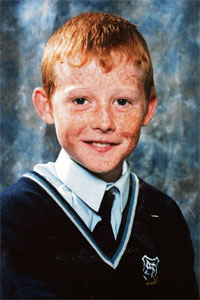 On 11 September 2002 a 14-year-old boy, Brian Rossiter, was found in a coma in a Garda cell in Clonmel. He died in hospital a few days later. On 16 January 2004, a solicitor acting for the parents of the boy wrote personally to Michael McDowell, setting out disquieting facts surrounding the arrest, detention and death of Brian Rossiter. This was followed by several other letters. Michael McDowell did nothing about the case until 29 June 2005 and then only following publicity for the case in Village.
On 11 September 2002 a 14-year-old boy, Brian Rossiter, was found in a coma in a Garda cell in Clonmel. He died in hospital a few days later. On 16 January 2004, a solicitor acting for the parents of the boy wrote personally to Michael McDowell, setting out disquieting facts surrounding the arrest, detention and death of Brian Rossiter. This was followed by several other letters. Michael McDowell did nothing about the case until 29 June 2005 and then only following publicity for the case in Village.
He subsequently appointed a senior counsel to conduct an inquiry into the case. No report, so far.
Indemnity Fiasco
In June 2002 the government did an indemnity deal with the religious orders whereby the state undertook to indemnify the orders for all claims against them for the abuse of children by their members in residential institutions on the payment of the equivalent of at most €77.6m. The total cost is now likely to be over €1bn, which means that the religious order will be paying less than 8 per cent (the initial understanding was they would pay half).
This deal was negotiated by Michael Woods, then minister for education, but the then attorney general, Michael McDowell, had a central involvement, or should have had.
The religious orders paid just €41m in cash. There was a transfer of property to the state representing €36.5m. And to dress up the deal, properties that had been transferred already to the value of €40.3m, were thrown into the mix and a credit of €10m for counselling. Thereby giving the impression that the total contribution from the religious orders was almost €130m.
But since the properties to be transferred to the state had been held in trust, there are doubts about the legality of any such transfer for purposes unrelated to the objectives of the original trusts. A problem that should have been addressed by the then attorney general.
The Gardaí – ignoring the Morris Tribunal reports
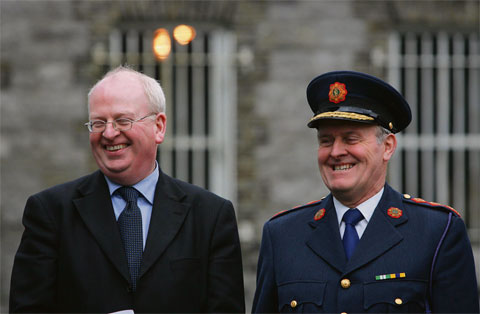 The first and most damning of the Morris Tribunal reports on Garda corruption, negligence and incompetence was published in July 2004. It found:
The first and most damning of the Morris Tribunal reports on Garda corruption, negligence and incompetence was published in July 2004. It found:
“The combination of corruption and negligence which characterised the relevant period in Co Donegal could easily occur again under different circumstances but obviously in a different way... it was the absence of structural command, coupled with utterly defective local management that led to the situation in Donegal... Garda headquarters never raised a query as to how an investigation was proceeding [into the bogus arms and explosives finds]... Regrettably the Tribunal... has come to the conclusion that An Garda Síochána is losing its character as a disciplined force... Ultimately the gradual erosion of discipline within An Garda Síochána is a developing situation that will, sooner or later, lead to disaster.”
And yet Michael MacDowell, following the publication of that first report, did nothing at all about the series of recommendations that were published. No Dáil debate on the report took place. No change to Garda disciplinary codes. Several of the gardaí impugned continued to serve in the force. No management changes took place.
In the second report of the Morris Tribunal, published in May 2005, all the recommendations of the first report were republished, in an obvious criticism of the indifference and inaction that followed the first report. It was only when a series of subsequent reports were being published in mid-2006 that Michael McDowell published changes to Garda disciplinary regulations.
He has followed through on the initiative of his predecessor, John O'Donoghue, on the establishment of an Ombudsman Commission to deal with complaints against An Garda Síochána, but there is evidence that this commission has met with resistance from within the Department of Justice, Equality and Law Reform and elsewhere, resistance that Michael McDowell has failed to remove.
State secrecy and a journalist
Michael McDowell single-handedly caused the collapse of the investigative agency, the Centre for Public Inquiry (CPI), by using secret Garda files to discredit the director of the centre, Frank Connolly. In an action unprecedented in the history of his office, as minister for justice he disclosed the contents of a secret Garda file first to a journalist, Sam Smyth of the Irish Independent, and then to a foreign national, “Chuck” Feeney, who had been funding the centre.
McDowell claimed that he did so because there was an apprehension that CPI would be used to pursue a Sinn Féin/IRA agenda and discredit mainstream politicians, thereby endangering the security of the state. He did so without showing how the work of an investigative agency, whatever its agenda, could undermine the security of the state or how mainstream politicians could be discredited in the absence of evidence to their discredit.
(Frank Connolly has been associated since May 2006 with Village and has been the author of several Village investigations concerning Michael McDowell)
The minister and the detective
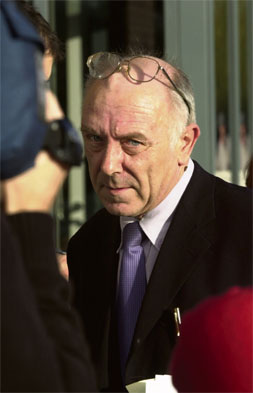 On 10 June 2005 Michael McDowell visited the remote Co Meath home of private detective Billy Flynn. The purpose of the visit was for McDowell to get material that would smear the record of the last Fine Gael minister for justice, Nora Owen, specifically in relation to her alleged failure to respond to representations from Billy Flynn and others over the Donegal garda scandal. According to Billy Flynn, during their conversation Michael McDowell attacked a named official in the criminal justice system. There was also a curious discussion about a judge.
On 10 June 2005 Michael McDowell visited the remote Co Meath home of private detective Billy Flynn. The purpose of the visit was for McDowell to get material that would smear the record of the last Fine Gael minister for justice, Nora Owen, specifically in relation to her alleged failure to respond to representations from Billy Flynn and others over the Donegal garda scandal. According to Billy Flynn, during their conversation Michael McDowell attacked a named official in the criminal justice system. There was also a curious discussion about a judge.
When Village asked Michael McDowell about this meting he threatened to sue Village. He also threatened the distributors and printers of Village.
Criminal Justice – much hyped legislative record
A year ago (on 10 March 2006) Michael McDowell boasted: “My record... on resourcing the criminal-justice system and bringing forward meaningful legislation is second to none – since my appointment as minister I've enacted 31 Bills with a further eight bills currently on the Dáil and Senate order paper”.
A closer examination of this record however gives a different impression.
Of the 31 Acts, eight implemented either EU law or legislation arising from the British-Irish agreement. Another 12 Acts were minor pieces of legislation. Another simply provided for the citizenship referendum and another wasn't really his bailiwick at all, the Disability Act 2005. Of the remaining nine acts, only five could be considered major pieces of legislation.
In addition to these, he got through the Oireachtas a major Criminal Justice Act in 2006. This had been on the order papers for over two years and a few weeks before debate on it was guillotined, he introduced 200 amendments to his own bill! Now a year after that, he is proposing yet more criminal-justice legislation, having been prompted to do so by the latest crime alarm.
This latest bill makes almost no difference in several respects and in one respect undermines a crucial protection for civil liberties, the right to silence.
Richard Bruton – knee high to McDowell
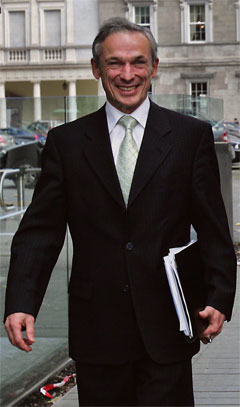 Last March Michael McDowell compared Fine Gael's deputy leader, Richard Bruton, to Nazi Joseph Goebbels. The comment came after Bruton highlighted a year-on-year increase of just two officers in Garda numbers in Dublin. McDowell said Bruton resembled “a kind of a postgraduate student floating around” the Dáil. He went on: “Deputy Bruton is knee-high to me in terms of anything he has ever managed to do for this country. Does anyone remember anything achieved by Deputy Bruton or Deputy Enda Kenny when they were in office?... [Richard Bruton] is the Dr Goebbels of propaganda.”
Last March Michael McDowell compared Fine Gael's deputy leader, Richard Bruton, to Nazi Joseph Goebbels. The comment came after Bruton highlighted a year-on-year increase of just two officers in Garda numbers in Dublin. McDowell said Bruton resembled “a kind of a postgraduate student floating around” the Dáil. He went on: “Deputy Bruton is knee-high to me in terms of anything he has ever managed to do for this country. Does anyone remember anything achieved by Deputy Bruton or Deputy Enda Kenny when they were in office?... [Richard Bruton] is the Dr Goebbels of propaganda.”
After a media controversy over the comment, Michael McDowell apologised: “I am big enough to admit I've made a mistake. I did play the man, not the ball, and I don't think it was fair of me. It was unfair of me to use those words about him and I want to apologise publicly. I know and like Richard Bruton and I don't believe he's the Joseph Goebbels of propaganda. It was over the top, it was intemperate and I was being thin-skinned.”
Prisons
There were on average 3,000 people in prison on a daily basis in 2005, costing the state €90,000 per prisoner per year. The Inspector of Prisons, Dermot Kinlen, has called the prison system a “disaster” and called for the closure of St Patrick's Institution and Mountjoy.
Mountjoy is severely overcrowded – on one day last year, when a man was beaten to death in an overcrowded cell, there were 520 prisoners in the prison, which has an official capacity of 420. There is also a widespread drug problem at the prison – it has the largest methadone treatment centre in the country.
Dermot Kinlen has been critical of Michael McDowell and his department. In the 2005 report, Kinlen uses the terms “fascist”, “pathetic” and “unbelievable” to describe the Department of Justice's management of the prison system.
He repeatedly has criticised the Minister for Justice and his department for failing to respect the human rights of prisoners and for ignoring his office. And he has complained that recommendations made in his first three annual reports have not been acted on, that his reports have been edited without consultation, and that they have been published on the last day of the Oireachtas term before the summer recess, effectively curtailing the opportunity to debate them.
Thornton Hall
Michael McDowell is responsible for his department paying almost €30m for the 150 acres at Thornton Hall, which is to be the site of a new prison to replace Mountjoy (also the site of a new Central Mental Hospital). That's €200,000 an acre.
In September 2006, the Comptroller and Auditor General said that agricultural land in the area was selling at between €20,000 and €30,000 per acre at the time of the Thornton Hall purchase in 2005 (ie between one-tenth and one-eighth of the price paid by the Department of Justice). The speculative price of lands in the vicinity was between €75,000 and €100,000. The comptroller concluded the price paid by the department was at least twice the going rate.
A Village investigation found that lands in the area, which have been sold since the purchase of Thornton Hall, sold for one-eighth of the price. There are other problems with the site. The road leading to the site is unsuitable for the amount of traffic accessing the prison complex, which will hold up to 800 people. There is no public transport. The site has no water mains or sewerage supply and the nearest hospital at Blanchardstown is some 40 minutes' drive away.
